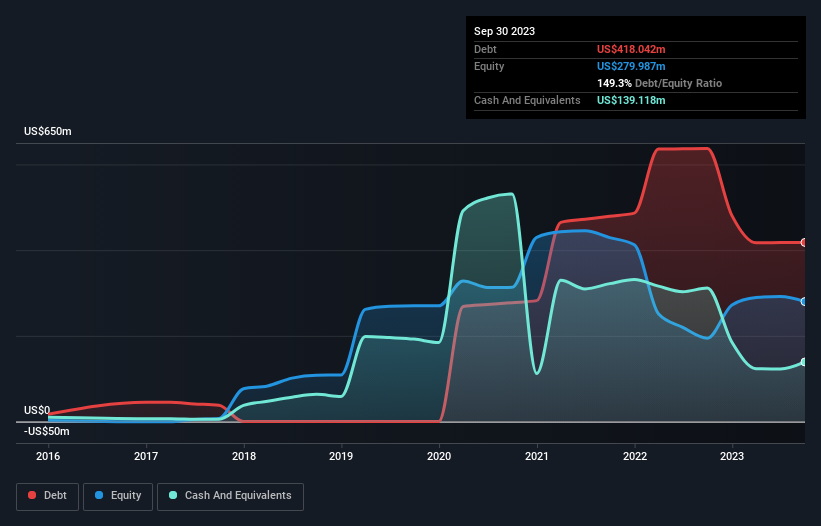- United States
- /
- Telecom Services and Carriers
- /
- NasdaqGS:BAND
Is Bandwidth (NASDAQ:BAND) A Risky Investment?
Warren Buffett famously said, 'Volatility is far from synonymous with risk.' So it might be obvious that you need to consider debt, when you think about how risky any given stock is, because too much debt can sink a company. We note that Bandwidth Inc. (NASDAQ:BAND) does have debt on its balance sheet. But should shareholders be worried about its use of debt?
When Is Debt Dangerous?
Generally speaking, debt only becomes a real problem when a company can't easily pay it off, either by raising capital or with its own cash flow. If things get really bad, the lenders can take control of the business. While that is not too common, we often do see indebted companies permanently diluting shareholders because lenders force them to raise capital at a distressed price. By replacing dilution, though, debt can be an extremely good tool for businesses that need capital to invest in growth at high rates of return. The first step when considering a company's debt levels is to consider its cash and debt together.
View our latest analysis for Bandwidth
What Is Bandwidth's Debt?
As you can see below, Bandwidth had US$418.0m of debt at September 2023, down from US$637.2m a year prior. However, it also had US$139.1m in cash, and so its net debt is US$278.9m.

How Healthy Is Bandwidth's Balance Sheet?
Zooming in on the latest balance sheet data, we can see that Bandwidth had liabilities of US$108.6m due within 12 months and liabilities of US$681.5m due beyond that. Offsetting this, it had US$139.1m in cash and US$75.0m in receivables that were due within 12 months. So it has liabilities totalling US$575.9m more than its cash and near-term receivables, combined.
This deficit casts a shadow over the US$367.7m company, like a colossus towering over mere mortals. So we'd watch its balance sheet closely, without a doubt. After all, Bandwidth would likely require a major re-capitalisation if it had to pay its creditors today. There's no doubt that we learn most about debt from the balance sheet. But ultimately the future profitability of the business will decide if Bandwidth can strengthen its balance sheet over time. So if you're focused on the future you can check out this free report showing analyst profit forecasts.
In the last year Bandwidth wasn't profitable at an EBIT level, but managed to grow its revenue by 9.3%, to US$593m. We usually like to see faster growth from unprofitable companies, but each to their own.
Caveat Emptor
Importantly, Bandwidth had an earnings before interest and tax (EBIT) loss over the last year. To be specific the EBIT loss came in at US$32m. When we look at that alongside the significant liabilities, we're not particularly confident about the company. We'd want to see some strong near-term improvements before getting too interested in the stock. Not least because it had negative free cash flow of US$12m over the last twelve months. So suffice it to say we consider the stock to be risky. The balance sheet is clearly the area to focus on when you are analysing debt. However, not all investment risk resides within the balance sheet - far from it. These risks can be hard to spot. Every company has them, and we've spotted 3 warning signs for Bandwidth (of which 2 are a bit unpleasant!) you should know about.
Of course, if you're the type of investor who prefers buying stocks without the burden of debt, then don't hesitate to discover our exclusive list of net cash growth stocks, today.
Valuation is complex, but we're here to simplify it.
Discover if Bandwidth might be undervalued or overvalued with our detailed analysis, featuring fair value estimates, potential risks, dividends, insider trades, and its financial condition.
Access Free AnalysisHave feedback on this article? Concerned about the content? Get in touch with us directly. Alternatively, email editorial-team (at) simplywallst.com.
This article by Simply Wall St is general in nature. We provide commentary based on historical data and analyst forecasts only using an unbiased methodology and our articles are not intended to be financial advice. It does not constitute a recommendation to buy or sell any stock, and does not take account of your objectives, or your financial situation. We aim to bring you long-term focused analysis driven by fundamental data. Note that our analysis may not factor in the latest price-sensitive company announcements or qualitative material. Simply Wall St has no position in any stocks mentioned.
About NasdaqGS:BAND
Bandwidth
Operates as a cloud-based software-powered communications platform-as-a-service provider in the United States and internationally.
Undervalued with adequate balance sheet.
Similar Companies
Market Insights
Community Narratives



